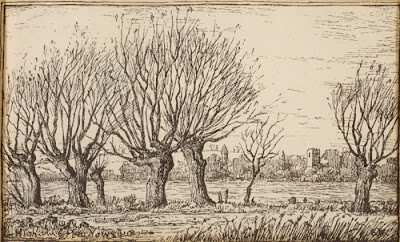The two of them had been emotionally estranged for some time. Where the fault lies, who can say? What we do know is that her death provoked in Hardy, in addition to grief, a sense of regret and self-recrimination that is movingly expressed in "Poems of 1912-13," as well as in dozens of other poems that Hardy wrote until his death in 1928.
The first poem in the sequence is "The Going." Hardy includes a postscript to the poem dating it "December 1912." I first read "The Going" when I was too young to know what grief and regret are. Still, its final stanza (which appears below) left me speechless -- and made me realize that Hardy was a poet who would stay with me throughout my life.
Albert Reuss (1889-1975), "Green Fence, Driftwood, and Pebbles"
Well, well! All's past amend,
Unchangeable. It must go.
I seem but a dead man held on end
To sink down soon. . . . O you could not know
That such swift fleeing
No soul foreseeing --
Not even I -- would undo me so!
Thomas Hardy, "Poems of 1912-13," Satires of Circumstance, Lyrics and Reveries (1914).
Of course, one response to "The Going" and the other poems about Emma might be: "Perhaps you would not have suffered such regret and self-recrimination if you had treated her properly while she was still alive!" "Too little, too late," or something like that. I think not. I find it presumptuous to act as a Regret Policeman for others. I do know this: on the evidence of the poems, Hardy was stricken to the core. I am willing to take him on his word.
Albert Reuss, "Two White Manikins" (1968)
The Walk
You did not walk with me
Of late to the hill-top tree
By the gated ways,
As in earlier days;
You were weak and lame,
So you never came,
And I went alone, and I did not mind,
Not thinking of you as left behind.
I walked up there to-day
Just in the former way;
Surveyed around
The familiar ground
By myself again:
What difference, then?
Only that underlying sense
Of the look of a room on returning thence.
Thomas Hardy, Ibid.
Albert Reuss, "Apples and White Sculpture" (1958)




















































